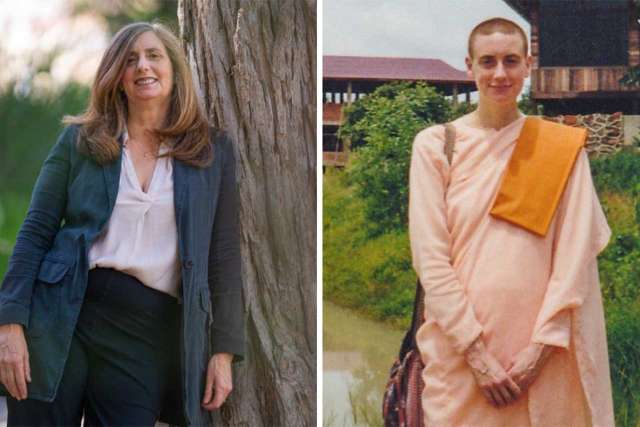A Mindful Visionary
Long before Diana Winston brought meditation practice to thousands as director of UCLA Mindful, she was ordained as a “bhikkhuni” — a Buddhist nun. And before that, two pivotal experiences shaped her interest in meditation and her future path.
The first was while traveling through Asia after graduating from Brown University. Winston joined friends at a meditation retreat in Dharamsala, India, where she heard a teaching that spoke to her deeply. It was a discussion about common preoccupations that trap human beings in suffering — praise and blame, pleasure and pain, gain and loss, fame and disrepute — and how meditation was a way out. “I heard it, and I was, like, ‘This explains my life,’” recalls Winston, who had up to that point been doggedly pursuing success and perfection. “From there, I started diving deeply into meditation practice.”
That led to her next illuminating experience, which came during a meditation retreat. Winston was part of a contingent that met the Dalai Lama. He directly addressed her interest in the intersection of meditation and social justice, characterizing mindfulness practice as an act of service and a way of cultivating a more peaceful world. “That experience is one of the most guiding moments of my life,” she says.
That insight from the Dalai Lama would inform the trajectory of Winston’s life and fuel her passion for sharing secular mindfulness, which she’s done at UCLA since 2006. From her earliest days of learning mindfulness — the practice of intentionally paying attention to present-moment experiences with curiosity and kindness as a way of becoming familiar with the nature of the mind — Winston wanted to share it. Initially, she focused on mindfulness practices to support political activism.
Winston was working with the Buddhist Peace Fellowship in Northern California when her meditation teacher suggested she go to Myanmar (formerly known as Burma) to continue her studies, and even become ordained as a Buddhist nun. Winston secured a meditation visa and found herself in an ancient monastery in the Burmese jungle. Deeply committed to the practice, she meditated 16-to-18 hours a day, breaking only for sleep and two meals before noon each day. She was ordained, shaved her head and wore salmon-colored robes. “I want to get enlightened,” she remembers thinking. “And if I practice the way it’s been done for thousands of years, particularly as a Buddhist nun, I should be getting enlightened by January.”
The pressure she put on herself to achieve enlightenment wasn’t unlike the perfectionism that drew her to seek relief in meditation in the first place. Yet, she found that the harder she tried, the more difficult everything became. She was about to give up monastic life when she stumbled upon a Tibetan Buddhist text that introduced her to a different approach to meditation, far less rigid than the style she’d been practicing. Where she was struggling to reach enlightenment, this book said the mind was already free. All she had to do was tap into her inherent awareness. “It was like the balm to my crazy, competitive soul,” she says.
Those teachings would go on to guide her future work, including writing The Little Book of Being: Practices and Guidance for Uncovering Your Natural Awareness, published in 2019. Winston eventually left the monastery, taught meditation at an elementary school in India and traveled to Sri Lanka. After returning to the U.S., she was invited to train with Jack Kornfield, PhD, a former Buddhist monk who helped pioneer mindfulness teachings in the West in the 1970s. Winston has, Kornfield says, “a visionary spirit.”
“From the beginning, she has cheerfully worked to pass on the practices that changed her life, starting with teens and moving on to all who could benefit,” he says. “UCLA is lucky to have her.”
UCLA behavioral genetics researcher Sue Smalley, PhD, saw something special in Winston, whom she met while studying the effects of mindfulness training on adolescents with ADHD. When Dr. Smalley later created the Mindful Awareness Research Center (MARC) at UCLA, she invited Winston to serve as its educational director.
Winston helped build the MARC program, developing public courses in mindful awareness practices that have reached thousands of people worldwide and been studied by academic researchers at UCLA and other institutions. She also helped create the UCLA Mindful app, which offers free meditations in 19 languages. Since 2023, Winston has been director of UCLA Mindful, which promotes mindfulness education within the UCLA Health System and beyond. She continues to lead free weekly meditation sessions and classes for the public, along with paid programs for those seeking more in-depth study.
When MARC began, few universities offered mindfulness instruction, and even fewer offered courses for the public, says Marvin G. Belzer, PhD, who leads sessions for UCLA Mindful and taught a semester-long undergraduate course on mindfulness practice and theory at UCLA before retiring in 2023. “Diana was the visionary” behind MARC’s public-facing classes, Dr. Belzer says. “Radical accessibility of these mindfulness practices was part of the mission from the beginning.”
Winston also created a yearlong mindfulness teacher-training program at UCLA, which has more than 550 graduates since 2011, and is a founder of the International Mindfulness Teachers Association, which upholds credentialing and training standards for mindfulness educators worldwide.
After devoting her life and career to mindfulness, Winston delights in the growing popularity of the practice. “Twenty years ago, I’m knocking on the door at UCLA saying, ‘Hey, there’s this thing called mindfulness. It’s good. Let me tell you why,’” she says. “Now, so many people know and love mindfulness.”
She remains passionate about sharing the practice with anyone who’s interested, driven by the idea the Dalai Lama expressed decades earlier: Mindfulness helps people experience greater joy, clarity and wisdom, which ultimately contributes to a more just, compassionate world. “The best part of my job is watching people transform, seeing people’s lives get better and better,” Winston says. “And it’s seeding compassion, seeding wisdom, seeding self-awareness on a larger cultural level.”
Sandy Cohen is a senior writer for UCLA Health Marketing Communications and a former national reporter for The Associated Press.
For more information about UCLA Mindful.




